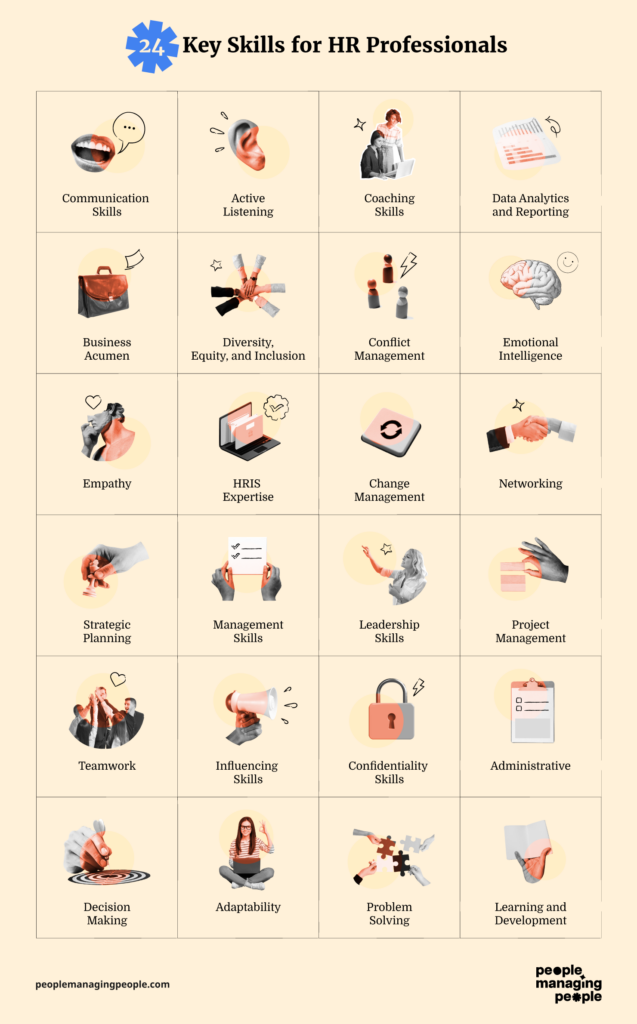From adapting to remote working to the onset of the most advanced technological tools the world has ever seen, it’s more important than ever for HR professionals to continue to upskill and help lead the way for organizations in the new world of work.
Here I’ll take you through 24 key human resources skills to work on to progress in your career and add greater value to your organization.
24 Key Skills For HR Professionals

1. Communication skills
One of the most important competencies for HR professionals is effective communication.
As an HR professional, you must be able to deliver a message clearly, whether speaking at a company-wide meeting or writing an email.
You will need to conduct interviews, interact with team members at all levels in the company, present information to co-workers and potentially the public, manage labor relations, and have genuine conversations with current and prospective employees.
Taking a communication course can help with verbal and written communication.
2. Active listening
In addition to being a good speaker, being a trusted HR practitioner requires that you be a good listener by deploying the skill of active listening.
Active listening means being present and listening to seek true understanding, not just waiting for the chance to respond or to communicate your point.
It helps both parties learn something new, build relationships, and cultivate trust.
3. Coaching skills
Advising and coaching your colleagues on the various business issues they face day-to-day is a regular occurrence.
On any given day, you may need to serve in this role for a diverse range of people from new employees, to first-level line managers, to executive leaders.
Being an effective coach means not just “giving advice” or telling your coachee what to do, but asking exploratory questions and empowering them to come up with their own insights and solutions.
When done well, coaching supports building great leaders within an organization and is a valuable skill. Check out this resource for advice on how to coach.
4. Data analytics and reporting
According to Harvard Business Review, over 70% of executives consider people analytics a main priority in their organization. Having literacy in this area will make you a more informed and credible HR practitioner.
There’s no shortage of people analytics tools to help organizations get visibility into their HR metrics and data. Even getting to grips with the humble Excel spreadsheet can benefit you greatly.
The trick is learning how to present relevant data in a way that is digestible and actionable. Pulling reports is one thing, telling a compelling story with data is another. HR analytics courses can help here.
5. Business acumen
According to a 2023 HR Trends report from Maclean, “HR’s role as a strategic partner has steadily increased since 2020”.
But to earn our seat, human resources professionals need to speak the language of their fellow business leaders and be knowledgeable about their organization’s operational models, financials, and overall company performance.
This will position HR as a strategic partner and help with creating HR processes, policies, and initiatives aligned with overall company goals and help drive the business forward.
6. Diversity, equity, and inclusion
It’s no secret that diversity, equity and inclusion are top of mind for both businesses and HR teams alike these days.
This area is important for any business leader, but HR is crucial for leading the charge when it comes to DEI.
Consider taking a DEI certification to become more knowledgeable about DEI work.
7. Conflict management
A primary role of HR is one of business representative. This means having to have the not fun conversations—enforcing a policy to ensure consistency, denying requests, or even conducting a termination.
To deliver such a message compassionately while remaining calm and direct takes some practice.
You’ll have to mediate between disagreeing colleagues one day and lead a group of business leaders to a decision that everyone can agree to the next.
This requires excellent communication and interpersonal skills, active listening, empathy, and influencing.
Well-managed conflict resolution builds confidence among team members, creates an atmosphere of trust, inspires open and honest feedback, and drives high performance.
8. Emotional intelligence
Emotional Intelligence, or EQ, means being able to identify, evaluate, and effectively respond to the emotional needs of yourself and others.
It also involves being able to manage your relationship with yourself and others. It’s a must-have skill for leaders and HR team members alike to be able to manage, motivate, and lead teams.
9. Empathy
Empathy, or the ability to relate emotionally to another person, is a component of EQ. It will likely be a long time (if ever) before AI will be able to understand and share the feelings of another person.
It is incumbent upon us to keep the “human” in “human resources” and remember to relate to and empathize with our fellow colleagues no matter the challenges we face.
10. HRIS expertise
The HRIS (human resource information system) is a key workforce management tool.
In addition to housing employee information and sensitive data, almost all business tasks that involve employees, including managing performance reviews, administering benefits, running payroll, and can be conducted within the HRIS environment.
Therefore, it’s critical to have a well-maintained HRIS with up-to-date data, and an expert on the team to manage the system. Consider an HRIS certification to expand your technical competence.
11. Change management
In life and work, the only true constant is change. By being a champion of change, HR can help support the success of change initiatives, thereby being a business partner in the company’s evolution.
This involves creating project plans for managing a change initiative, thinking through the needs assessments for how to deliver critical timely information to stakeholders, communicating the change to employees, and supporting the team’s emotions.
Liz Lockhart’s article How To Become A Change Leader is a great resource here.
12. Networking
Networking is an important skill for HR practitioners as it opens the door to building relationships with other professionals in the field and supports the ability to keep on top of changing trends in the industry.
Networking is not just something to practice externally, but internally in your organization to build relationships and deepen your understanding of the business.
While networking may not be the first thing that comes to mind as strictly an “HR skill”, it’s a skill and a competitive advantage that can help you grow professionally at an accelerated rate.
13. Strategic planning
Strategic planning is crucial to aligning human resources with the overall business strategy, ensuring that the organization's workforce can meet current and future business challenges.
This approach enables effective talent management, workforce planning, and helps in driving organizational growth and adaptation to changing market conditions, ultimately contributing to the long-term success of the company.
14. Management skills
If you want to be an effective HR manager and competently advise other managers in the organization then management skills are a must.
Key management skills are resource allocation, delegation, making project plans, financial acumen, and process optimization. Liz Lockhart’s article on people management is a fantastic resource here.
15. Leadership skills
Yes, leadership and management are different. While management is directive in nature, leadership is the ability to inspire and influence others toward a certain goal.
Anyone can be a leader, regardless of their job title. It’s about seeking to understand others, what motivates them, what their skills are, and then getting the best out of them.
Strong leadership plays a key role in driving employee engagement, motivation, and retention.
16. Project management
As a strategic partner of the business, you’re going to be heading up complex initiatives and strong project management skills will come in handy.
These include project planning, scheduling, managing budgets, documentation development, task management, and prioritization.
These project management certifications are a great place to start.
17. Teamwork
As a strategic partner, you’re going to participate in cross-functional teams to share knowledge, pool resources, and approach issues from diverse perspectives.
It’s also important you help foster teamwork within the wider organization by helping to break down silos and bring people together by facilitating mentorship programs and employee resource groups.
18. Influencing skills
Influencing skills such as persuasion and assertiveness are vital for HR leaders as they help them guide stakeholders and employees toward shared goals.
These skills help when working with senior leaders to help drive organizational change and ensure adherence to best practices.
19. Confidentiality skills
As an HR professional, you’re going to be trusted to handle sensitive information and ensure legal compliance.
Mastery in maintaining confidentiality upholds the integrity of HR processes, protects employee privacy, and fosters a secure and respectful workplace.
This ability is crucial in building and maintaining trust, preventing data breaches, and adhering to legal and ethical standards, ultimately reinforcing the HR department's credibility within the organization.
20. Administrative
Although HR technology and automation have reduced the administrative burden on HR professionals and freed up time for more strategic work, admin is still part of the job.
Strong administrative abilities in HR contribute to operational efficiency, accuracy, compliance, and the provision of timely support and services to employees, which are essential for the overall functionality and success of human resource management.
21. Decision-making
Being able to make decisions critically and objectively is an important skill for HR practitioners.
As we’re heavily involved in the recruitment process and workplace investigations, being able to minimize bias from our thinking and the thinking of others will lead to better decision-making and the fair and ethical management of personnel.
22. Adaptability
Working in HR is rolling with the punches and adapting to changes in the work environment, especially in startups and SMEs.
Being adaptable fosters resilience, encourages innovation, and helps maintain alignment with organizational goals despite external and internal changes, ensuring the continuous relevance and effectiveness of HR initiatives.
23. Problem-solving
A lot of the time, people are going to come to you with their problems. As such, problem-solving skills are vital in HR because they help you to identify, analyze, and resolve any issues efficiently.
"What remains beyond the reach of outsourcing is the impact of creative problem-solving and the authentic connections with individuals," says Keri Ohlrich, CEO of Abbracci Group and author of "The Way of the HR Warrior. "The ability to approach challenges with creative flair is an advantage that can't be replaced."
Problem-solving will be important for managing employee disputes, adapting to organizational changes, and implementing effective HR solutions.
24. Learning and development
Being a good learner underpins developing new skills to help you in your role.
Additionally, as learning and development is a function of HR, if this interests you then you’ll need to develop expertise in facilitation, training needs analysis, and training program design.
Taking a specialist learning and development certification is a good place to start here.
Developing Your Human Resources Skills
It pays dividends to invest in yourself and evolve your toolbox of hard and soft skills.
- Professional certifications: Obtaining an HR certification is a great way to gain skills and knowledge, try out potential new career paths, and connect with the wider community.
- Networking and industry events: Joining HR communities and attending industry events such as HR conferences are great for exchanging ideas, learning from peers, and staying informed about emerging HR challenges and solutions.
- Mentorship and coaching: Seeking mentorship from experienced HR leaders or engaging in coaching can provide personalized guidance and insights into personal skill development (not least how to mentor and coach).
- Cross-functional collaboration: Working closely with different departments on cross-functional projects helps you understand various business functions and challenges, broadening your perspective and enhancing your ability to contribute strategically.
Get more advice on HR skill development by joining the People Managing People Community, a supportive community of HR and business leaders passionate about building organizations of the future.


